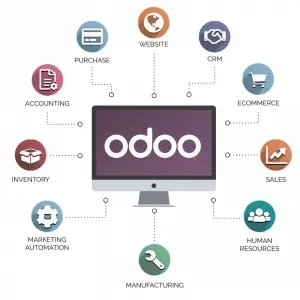Odoo ERP comes with thousands of modules like CRM, sales management module, order management module, warehouse management, inventory management, accounts management, and more. Here’s the list of the 10 most common mobiles every business must integrate during Odoo development and implementation.
In the world of business software called Enterprise Resource Planning (ERP), Odoo is a standout because it's versatile and free to use. Odoo is like a toolbox with many different tools, called modules. These modules are like building blocks that businesses can use to customise Odoo for their specific needs.
This article will let you go through all the common modules in Odoo, what they do, and how they can help businesses work more efficiently. Odoo is known for being flexible, so you can choose only the modules that fit your business. It doesn't matter if you're in retail, manufacturing, healthcare, education, or any other industry – there's probably an Odoo module that can make your work easier.
Here are the 10 Odoo Modules Every Business Must Use

The fundamental pillars of the ERP system are the core Odoo modules, laying the groundwork for essential functionalities across diverse business operations. These modules are seamlessly integrated into Odoo, ensuring immediate accessibility for users. Here's an overview of these foundational Odoo modules.
Sales:
The Sales module orchestrates the entire sales process, from lead inception to order completion. It facilitates the tracking of leads, opportunities, quotations, and sales orders.
Inventory:
Efficiency in inventory management is achieved through this module, enabling businesses to seamlessly handle product listings, stock levels, and movements.
Accounting:
Simplifying financial management, the Accounting module oversees tasks from invoicing to account reconciliation. It supports multi-currency transactions and generates vital financial reports.
Purchase:
Indispensable for procurement and vendor management, the Purchase module streamlines purchase orders, supplier communication, and goods receipt.
CRM (Customer Relationship Management):
Focused on building and nurturing customer relationships, CRM aids in lead tracking, customer interactions, and the management of sales pipelines.
Website:
Businesses leverage the Website module to create and manage their online presence through Odoo. It proves to be a valuable tool for e-commerce and content management.
Manufacturing:
Manufacturers benefit from the Manufacturing module, assisting in production orders, work centers, and Bill of Materials (BOM).
Human Resources:
Simplifying the management of employee information, attendance, leaves, and timesheets is the primary focus of the Human Resources module.
Point of Sale (POS):
Transforming any device into a point-of-sale terminal, the POS module facilitates retail businesses in processing sales transactions.
eCommerce:
Tailored for online businesses, the eCommerce module equips users with tools for creating and managing online stores, product catalogs, and shopping carts.
Human Resource Management or HRM:
People are super important for a business to do well and make money. Human Resources (HR) is like the backbone of any business. It's the team that helps the business grow and be successful. A good HR system makes sure the business can find the right people, help them do their job well, and take care of them. From hiring new folks to checking how everyone is doing, all the HR jobs should be organised to make the business better. Odoo HRMS is like a big helper with tools for managing employees, hiring, time off, performance reviews, job referrals, and even taking care of work vehicles. It puts all the HR stuff in one place, making everything easier for the business.
Why use Odoo ERP modules? Here are four simple benefits:
- Get Things Done Faster: Odoo makes work easier by doing tasks automatically and putting information from different parts of the company together. This helps to avoid doing the same thing more than once.
- Make Customers Happier: Odoo keeps track of everything about customers, like what they buy and when they need help. This helps businesses serve customers better by being faster and more personal.
- Understand Your Business Better: Odoo has tools that show businesses how they are doing. This helps them make smarter choices because they know more about how their business works.
- Save Money: Odoo can save businesses money by doing things automatically, using less paper, and not having to type in information by hand.
Plus, Odoo is not too expensive, and it's a complete system that works well together. It's like getting just what you need for your business, and you can add more parts when you need them.
These core modules constitute the foundational elements of the Odoo ERP system, comprehensively addressing various facets of business management. However, Odoo's adaptability extends beyond these modules, offering additional modules tailored to specific business processes and industries, as explored in the next section.
Rob Stephen is an expert in Odoo development and a proficient Odoo consultant associated with an official Odoo Gold partner in Australia, Envertis. In this article, the author has outlined the top 10 Odoo modules that every business should get integrated to streamline their business processes.
